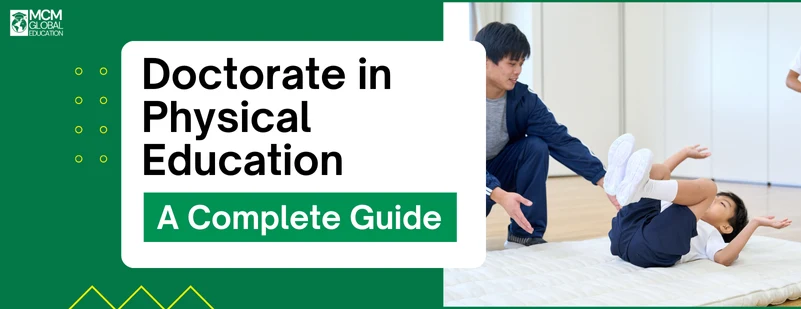Earning a Doctorate in Physical Education (Ph.D. in Physical Education) is one of the most rewarding academic pursuits for those passionate about sports sciences, health education, exercise physiology, biomechanics, and overall wellness. With rising awareness about fitness, sports, and health, there has been an increasing demand for professionals who can research, teach, and lead in the field of physical education.
In this detailed blog, we will cover everything you need to know about pursuing a doctorate in physical education—from eligibility and syllabus to career scope, salary, and global opportunities.
Table of Contents
What is a Doctorate in Physical Education?
A Doctorate in Physical Education is a research-based program designed to prepare scholars, researchers, educators, and sports scientists for advanced roles in academics, sports management, and health sciences.
This program emphasizes independent research, advanced methodologies, and contributions to knowledge in areas like:
- Exercise physiology
- Biomechanics
- Sports psychology
- Health promotion
- Adapted physical education
- Kinesiology
Graduates often work as university professors, sports scientists, policy makers, researchers, and athletic trainers.
Why Pursue a Doctorate in Physical Education?
Here are some strong reasons to pursue a doctorate in physical education:
| Reason | Details |
|---|---|
| Academic Excellence | Opportunity to teach at the university level and publish research. |
| Research Opportunities | Work on advanced studies in sports sciences, exercise physiology, biomechanics, and wellness. |
| Career Growth | High-paying positions in education, research institutions, government organizations, and sports councils. |
| Global Demand | Rising awareness of fitness and health has created demand for Ph.D. scholars globally. |
| Contribution to Society | Influence health policies, sports development, and fitness awareness. |
Eligibility Criteria for Doctorate in Physical Education
Though requirements vary by country and institution, here are the general eligibility criteria:
Educational Qualification
- A master’s degree (M.P.Ed / M.Phil in Physical Education / related field) with at least 55%–60% marks.
- Some institutions may require NET/SET qualification.
Entrance Exams
- Common entrance tests or university-level exams may be required.
- Some universities require a research proposal submission.
Other Requirements
- Statement of purpose (SOP)
- Recommendation letters
- Work or teaching experience (preferred)
Duration of Doctorate in Physical Education
| Country | Typical Duration |
|---|---|
| India | 3–5 years |
| USA | 4–6 years |
| UK | 3–4 years |
| Australia | 3–5 years |
| Canada | 4–6 years |
Syllabus and Subjects in Doctorate in Physical Education
The Ph.D. in Physical Education syllabus is research-oriented and may differ depending on specialization.
Common Subjects:
- Research Methods in Physical Education
- Biomechanics and Kinesiology
- Exercise Physiology
- Sports Psychology
- Measurement and Evaluation in Physical Education
- Advanced Statistics and Data Analysis
- Adapted Physical Education
- Sports Management and Policy
- Dissertation/Thesis
Sample Year-Wise Breakdown:
| Year | Focus Area |
|---|---|
| Year 1 | Coursework in research methodology, statistics, and advanced sports sciences |
| Year 2 | Specialized study + literature review |
| Year 3 | Research work, data collection, experiments |
| Year 4 | Thesis writing, publication, and defense |
Top Universities Offering Doctorate in Physical Education
Here’s a list of top universities worldwide offering a doctorate in physical education or related fields:
| University | Country | Specialization Areas |
|---|---|---|
| Loughborough University | UK | Sport Science, Biomechanics, Exercise Physiology |
| University of Michigan | USA | Kinesiology, Sport Psychology |
| University of Sydney | Australia | Physical Activity & Health, Biomechanics |
| Banaras Hindu University (BHU) | India | Exercise Physiology, Sports Education |
| McGill University | Canada | Human Movement, Physical Activity Research |
Career Scope After Doctorate in Physical Education
A doctorate in physical education opens diverse career opportunities in research, education, sports science, and health promotion.
Career Roles:
- University Professor
- Sports Scientist
- Athletic Trainer
- Biomechanist
- Exercise Physiologist
- Sports Psychologist
- Policy Advisor in Sports and Health
- Researcher in Fitness & Wellness Organizations
Salary After Doctorate in Physical Education
Salary varies by country, role, and expertise.
| Country | Average Salary (per year) |
|---|---|
| India | ₹8–15 LPA |
| USA | $70,000–$110,000 |
| UK | £40,000–£65,000 |
| Canada | CAD 60,000–90,000 |
| Australia | AUD 80,000–110,000 |
Benefits of Doctorate in Physical Education
- High Academic Recognition – Opportunity to publish in reputed journals.
- Global Mobility – Work in international universities or research centers.
- Policy Influence – Contribute to shaping national sports and health programs.
- Personal Growth – Develop expertise in advanced physical education and sports sciences.
Challenges of Pursuing a Doctorate in Physical Education
- While rewarding, pursuing a doctorate in physical education comes with challenges:
- Intense research workload.
- Requires strong commitment and consistency.
- Funding and scholarships can be competitive.
- Balancing teaching responsibilities with research.
Skills Required for Doctorate in Physical Education
| Technical Skills | Soft Skills |
|---|---|
| Research Methodology | Critical Thinking |
| Data Analysis | Leadership |
| Sports Science Expertise | Communication |
| Biomechanics & Physiology | Time Management |
| Academic Writing | Problem Solving |
Future Scope of Doctorate in Physical Education
The future of doctorate in physical education is promising due to increasing health consciousness, sports advancements, and policy-level support.
Future Trends:
- Integration of AI and technology in sports sciences.
- Growing demand for fitness consultants with research expertise.
- Expansion of sports psychology in professional sports.
- Government-funded research in health and physical education.
FAQs on Doctorate in Physical Education
Q1. What is the duration of a doctorate in physical education in India?
Ans: Typically 3–5 years.
Q2. Can I pursue a doctorate in physical education without a master’s degree?
Ans: No, a master’s degree (M.P.Ed or related) is mandatory.
Q3. What is the career scope after Ph.D. in physical education?
Ans: Careers include professor, researcher, sports scientist, physiologist, and consultant.
Q4. Is a doctorate in physical education worth it?
Ans: Yes, it opens opportunities in academics, sports research, and global positions.
Q5. Which country is best for pursuing a Ph.D. in physical education?
Ans: USA, UK, Australia, and Canada are popular destinations.
Conclusion
A Doctorate in Physical Education is not just a degree; it is a gateway to academic excellence, research leadership, and global career opportunities in the field of sports and health sciences. With rising demand for fitness and wellness professionals, pursuing a doctorate in this discipline can provide both professional satisfaction and financial rewards.
Whether you aspire to become a professor, sports scientist, or policy advisor, a doctorate in physical education equips you with the skills and credibility to make a real difference.























